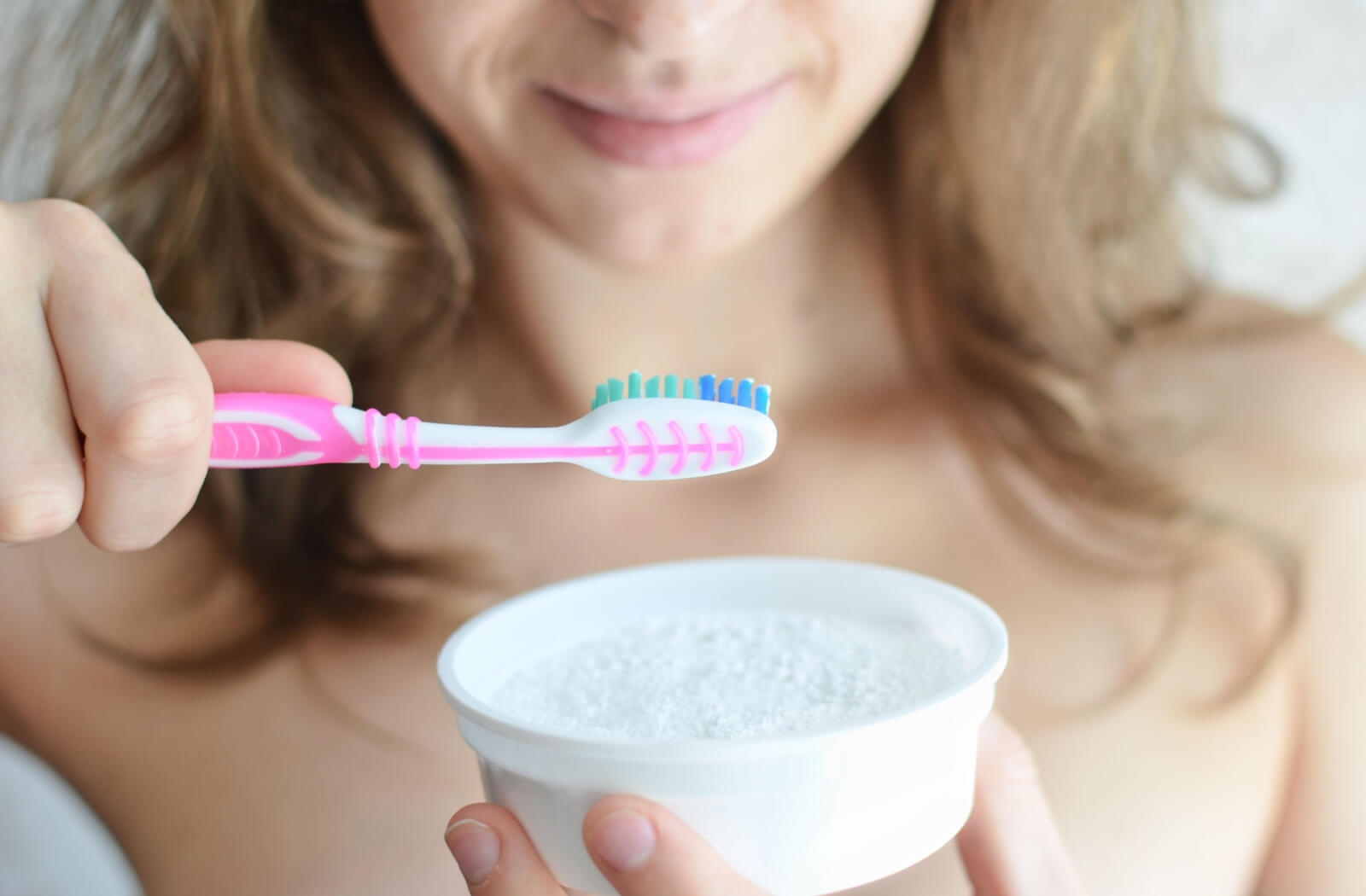Baking soda has many uses around the home. It makes bread rise, eliminates smells, and cleans your pots. But did you know you can also use it on your teeth?
Baking soda is a popular tool to whiten your teeth. It has abrasive yet gentle properties that may help remove surface stains and clean enamel. Baking soda won’t replace your routine cleanings at your dentist, but it can be a part of an at-home teeth whitening routine if you know how to use it properly.
How Do Teeth Get Stained?
Your teeth are susceptible to many things that can leave them discoloured. Some of the most common ones include:
- Aging
- Drinking coffee, tea, red wine, or other dark-coloured beverages
- Smoking and using tobacco products
- Eating staining foods such as berries or tomato sauce
- Simple sugars
- Certain medications, such as tetracycline antibiotics
Stains can occur on a tooth’s outside (extrinsic) and the inside (intrinsic). While stains can be cosmetic, they can also be a sign of a more severe problem. A grey tooth or gums can indicate tooth decay, and a dentist should examine them as soon as possible.
How Can Baking Soda Whiten Your Teeth?
While teeth discolouration can be a natural part of life, it may also leave you nervous about your smile. Teeth whitening is a standard cosmetic procedure that can lighten your teeth. Both in-office and at-home, teeth whitening is generally considered an effective and safe way to improve the brightness of your smile.
How to Whiten Your Teeth with Baking Soda
To use baking soda to whiten your teeth, simply mix equal parts of baking soda with water to form a paste. Brush your teeth with the paste for a minute, then rinse thoroughly with water. Since baking soda is a mild abrasive, repeated use may remove stains from the outside of your teeth. You can do this about once a week in addition to your regular tooth-brushing routine to see results.
It’s also important to keep brushing your teeth with regular toothpaste since baking soda doesn’t contain fluoride, a vital mineral that helps prevent tooth decay.
Other Ways to Whiten Teeth at Home
Baking soda isn’t typically a dramatic whitening solution, but it can be helpful for people looking for just a couple of shades of brightness. Other teeth whitening options usually use hydrogen peroxide, a chemical that, with safe use, can lessen stains.
Common at-home teeth whitening products include:
- Whitening Strips: By applying thin hydrogen peroxide strips to your teeth, you may be able to remove stains from the enamel.
- Whitening Trays: Whitening trays are custom-fitted for your teeth. They’re then filled with a peroxide-based gel and worn for several hours or overnight.
- Whitening Pens: These are small tubes that contain a whitening gel. They’re generally only effective for spot treatments, and the gel may wash off when you eat or drink.
- Whitening Toothpaste: A simple solution may be to replace the toothpaste you’re already using with whitening toothpaste. This works similarly to baking soda, using abrasive particles to remove surface stains.
Your dentist can help you decide on at-home teeth whitening products and ensure they’re safe for your teeth.
Can a Dentist Whiten Teeth?
While at-home treatments can help with surface stains, some discolouration can reach below the surface. These intrinsic stains require higher concentrations of hydrogen peroxide, and dentists can offer this along with advanced bleaching techniques.
There are two types of whitening systems. One of the systems use LED light to help activate specially-made peroxide gels designed to penetrate through the enamel and interact with the staining compounds in your teeth. The gel and high-intensity LED light work together to break down stains both on the surface and inside your teeth. A teeth whitening session may take about an hour, depending on the number of gel and LED light applications.
The other type of whitening system works without an LED light where the whitening agent is activated by mixing two ingredients. This technique uses approximately 38% hydrogen peroxide which lightens and brightens the teeth, and potassium nitrate which helps strengthen the enamel, reduce sensitivity and protect against cavity. When these two ingredients are combined, they become an active teeth whitening system that is effective and can be completed in a single session.
How Long Does Teeth Whitening Last?
No teeth whitening procedure lasts forever, and the effectiveness will depend on your method.
Typically, at-home teeth whitening methods last up to a few months without any upkeep. However, your dentist may be able to whiten your smile from anywhere for a year or more.
Let Us Help Brighten Your Smile
Everyone loves a bright smile, but chasing down whiter teeth shouldn’t be stressful. At-home teeth whitening is a popular way to remove stains, and the best part is you don’t have to do it alone.
Our team at Markham Dental Smiles in Unionville will do our best to help you achieve the smile you always wanted. We can offer personalized in-home whitening treatments as well as professional in-office whitening.
If you’re looking for whiter teeth or any other dental procedure, contact us today!







